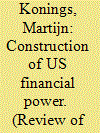| Srl | Item |
| 1 |
ID:
169050


|
|
|
|
|
| Summary/Abstract |
Financial literacy is defined as the knowledge, skills, and ability to navigate increasingly complex financial markets, and is considered to empower consumers to make responsible financial decisions. It has been widely promoted as a crucial life skill following the 2008 financial crisis. This study critically analyzes financial literacy education initiatives in Turkey through ethnographic research. Financial literacy curricula provide the basic knowledge of finance as well as instruct subjects ways to conduct financial planning, budgeting, debt management, creditworthiness, saving, and investment. Financial literacy agenda deepens neo-liberal governmentality by promoting an entrepreneurial subjectivity and making individuals more aware and responsible for social risks. The cultural political economy perspective of this study analyzes financialized capital accumulation dynamics together with the reshaping of culture and the constitution of financialized subjectivities.
|
|
|
|
|
|
|
|
|
|
|
|
|
|
|
|
| 2 |
ID:
086443


|
|
|
|
|
| Publication |
2009.
|
| Summary/Abstract |
Critical work in international political economy (IPE) has sought to theorise US financial power through the concept of structural power, intended as a means to go beyond state-centric conceptions of political power and to trace the state's interaction with socio-economic forces. But due to the tendency to ontologise the distinction between state and market, IPE has not been fully successful in articulating the linkages between structural power and state power. The article then examines literature in the field of cultural political economy (CPE), which emphasises the constitutive importance of the cultural norms and practices situated at the level of everyday life. The CPE literature fails to challenge established IPE accounts in some key respects, and the article relates this to its conception of political power. The article develops an institution-based perspective that is more suitable to theorising the linkages between structural power and state power, and then proceeds to develop an interpretation of the construction of American financial power over the course of the 20th century. It reinterprets some of the key moments in the history of US and global finance and re-examines notions of American financial decline.
|
|
|
|
|
|
|
|
|
|
|
|
|
|
|
|
| 3 |
ID:
121735


|
|
|
|
|
| Publication |
2013.
|
| Summary/Abstract |
In this article I examine the Korean Wave as an illustrative case of cultural globalization. I examine this new cultural phenomenon in light of the realignment of Korean media and cultural industries. The Korean Wave is a symptom of the discursive formation and practice of Korea's national cultural policy, which aims to advance Korea's global economic competitiveness by promoting innovation and expansion in the creative industries. I identify implications of the Korean Wave for critical theories of cultural globalization and for the Asian region in fostering or hindering regional cooperation and cultural diversity.
|
|
|
|
|
|
|
|
|
|
|
|
|
|
|
|
| 4 |
ID:
155761


|
|
|
|
|
| Summary/Abstract |
Since the early 2000s, the discourse of “economic territory” has surfaced in conjunction with economic neoliberalization in South Korea. This paper argues that economic territory as a geoeconomic imaginary not only facilitated the expansion of free trade agreements as an accumulation strategy but also served as a hegemonic project which masked the nature of an accumulation strategy as a class project and consolidated political legitimacy by manipulating nationalism. To examine this linkage, it critically draws upon the idea of cultural political economy (CPE) developed by Lancaster-based sociologists Bob Jessop and Ngai-Ling Sum. This paper offers a fresh and more substantial interpretation of South Korea’s political economy and opens up new analytical space for CPE.
|
|
|
|
|
|
|
|
|
|
|
|
|
|
|
|
| 5 |
ID:
116895


|
|
|
|
|
| Publication |
2013.
|
| Summary/Abstract |
Contemporary globalisation is characterised by an explosion of organisational pluralism. Acronyms such as brics (Brazil, Russia, India, China and South Africa), ibsa (India, Brazil and South Africa), and basic (Brazil, South Africa, India and China) abound. This proliferation of groupings signals a repositioning within global governance and their names serve as metaphors for adjustments among formal and informal modes of global governance. They may be understood in terms of global bricolage: a framework for analysing incipient assemblages in global governance. Rooted in cultural political economy, this notion offers a language for grasping a loose meshwork of groupings based on certain large countries in the global South. The concept of global bricolage deepens analysis of polycentric governance and enables observers to identify three major tensions that mark contemporary global order. The antinomies are between old and new narratives that represent actual or potential shifts in prevailing forms of global governance, between an emancipatory spirit and contested neoliberal norms, and between interregional coalitions and intraregional differences. Quite clearly, the manner of addressing them will bear greatly on the shape of future world order.
|
|
|
|
|
|
|
|
|
|
|
|
|
|
|
|